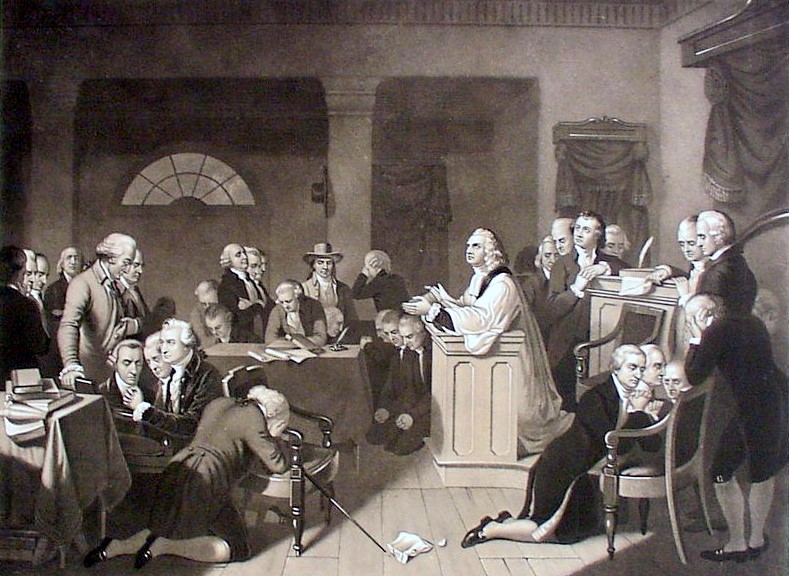 LEHIGH COUNTY, Pa. — A federal judge in Pennsylvania has reluctantly ruled that a county in the Commonwealth can’t include a Christian cross in its official seal.
LEHIGH COUNTY, Pa. — A federal judge in Pennsylvania has reluctantly ruled that a county in the Commonwealth can’t include a Christian cross in its official seal.
U.S. District Judge Edward Smith, nominated to the bench by then-President Barack Obama, wrote in his ruling that he doesn’t believe that Lehigh County’s inclusion of a cross in its 73-year-old seal violates the Establishment Clause in the way that the Founding Fathers intended when they wrote the U.S. Constitution.
“Lehigh County’s seal is a passive symbol that does not coerce any citizen to practice or adhere to Christianity, and does not establish a county religion. Thus, the seal does not violate the plain text of the Establishment Clause. Nor does it establish religion in the way the drafters of the First Amendment imagined,” he stated.
However, Smith said that he felt he had to adhere to the standards of higher courts that have concluded otherwise.
“Higher courts, however, have delineated a different mechanism by which the court must determine whether the seal survives constitutional scrutiny,” Smith continued. “While the court may not fully agree with the test provided, the court must apply that test.”
The Wisconsin-based Freedom From Religion Foundation (FFRF) had filed a lawsuit against Lehigh County in August 2016 on behalf of four residents who asserted that the inclusion of the cross on the county seal, which appears on official documents and inside of government buildings, violates the separation of Church and State.
“As a resident of Lehigh County, Mr. Simpson has been subjected to viewing the seal, which he finds offensive,” the legal challenge read. “Mr. Simpson does not want his county government to be represented by a Christian symbol.”
“The display of the Latin cross by Lehigh County has the primary effect of both advancing religion and expressing Defendant’s preference for Christianity above all other religions and nonreligion,” it also contended. “The adoption and display of the Latin cross constitutes an endorsement of religion by Lehigh County.”
However, in analyzing the suit, Judge Smith noted that the Founding Father’s prohibition on the establishment of religion only related to a national establishment similar to the Church of England, which the Puritans sought to escape so they could worship God according to the dictates of their own conscience.
“There is ample historical evidence to suggest that James Madison, the First Amendment’s drafter, was concerned with the establishment of a national religion similar to that of the Church of England that would encroach on citizens’ freedom of conscience, compel conformity, and levy taxes in its name,” he wrote.
“By including a Latin cross on the Seal, the County has chosen to celebrate the Christian values important throughout its history. The County has not, however, legally compelled its citizens to practice and conform to Christianity, infringed on freedom of conscience, or created political conflict between the Christian Church and other religious sects,” Smith continued.
“Simply put, the County of Lehigh did not intend to ‘establish’ religion or institute a County religion when it adopted Commissioner Herzog’s design for the seal.”
However, the judge felt that he must follow court precedent such as the U.S. Supreme Court’s “Lemon test,” and the Third Circuit’s “endorsement test,” in which judges decide whether the symbol at issue “has a secular purpose,” as well as whether an observer would consider the image as being an endorsement of a particular religion.
“In this case, the reasonable observer would know that the cross is a symbol of Christianity, that the settlers of Lehigh County were Christian, and that Commissioner Hertzog designed the seal with the God-fearing people of the county in mind,” Smith wrote. “With this knowledge base in mind, the court must conclude that a reasonable observer would perceive the seal as endorsing Christianity.”
Therefore, with reluctance, and clearly expressing his belief that the symbol did not violate the Establishment Clause in the way that the founders intended, he said that he had to rule against the symbol due to the tests that the courts have created.
FFRF has applauded the decision. The County has not yet indicated whether it plans to appeal.
 As previously reported, in a recent dissenting opinion in a New Mexico Ten Commandments case, 10th Circuit Court of Appeals Judges Paul Kelly, Jr. and Chief Judge Timothy Tymkovich noted that the Establishment Clause is being interpreted incorrectly and not in “the historical understanding of an ‘establishment of religion,’ and thus with what the First Amendment actually prohibits.”
As previously reported, in a recent dissenting opinion in a New Mexico Ten Commandments case, 10th Circuit Court of Appeals Judges Paul Kelly, Jr. and Chief Judge Timothy Tymkovich noted that the Establishment Clause is being interpreted incorrectly and not in “the historical understanding of an ‘establishment of religion,’ and thus with what the First Amendment actually prohibits.”
They explained that “[e]stablishment was … the norm in the American Colonies. Exclusive Anglican establishments reigned in the southern states, whereas localized Puritan establishments were the norm in New England, except in Rhode Island.”
This began in Europe, “the continent of origin for most American colonists,” Kelly outlined. “[E]ach country had long established its own state church—a generalized version of cuius regio, eius religio—over which each government exercised varying degrees of control. Germany and Scandinavia had official Lutheran establishments; Holland, a Reformed state church; France, the Gallican Catholic Church; Ireland, the Church of Ireland; Scotland, the Church of Scotland; and so on.”
Therefore, the Establishment Clause of the U.S. Constitution regarding “respecting an establishment” only referred to showing favoritism to one state establishment over another, and solely applied to the federal government.
“From the words of the text, though, two conclusions are relatively clear: first, the provision originally limited the federal government and not the states, many of which continued to support established churches; and second, the limitation respected only an actual ‘establishment of religion,’” the federal judges outlined.
Become a Christian News Network Supporter...


